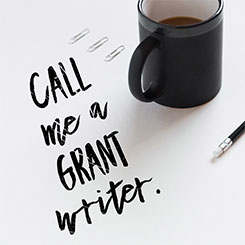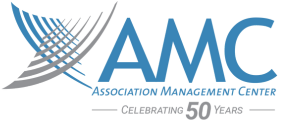
Call Me a Grant Writer
When meeting new people at work, I am often introduced as the grant writer. I like being called a grant writer. When I first transitioned into this area of work, I imagined sitting undisturbed in a cubicle spending my days writing and putting together well thought out, neat and tidy proposal packets. It was a great fantasy.

The fact is “grant writer” is a misnomer. While I do spend a bit of time writing proposals, the reality is that I go to a lot of meetings and I spend a lot of time interacting with others -- program staff, finance team, marketing and communications staff, volunteers and various committee members.
So, you may be asking yourself… Geez, what could a grant writer be doing if they aren’t just pounding out proposals and collating documents? For those who work with us or for the curious, here’s a synopsis.
Grant professionals (the generally accepted moniker) are involved from project inception to final reporting after the project is completed. When invited to participate on a project, I offer three core services. In brief:
- Identify funding opportunities
- Develop proposal and budget based on input and information provided by the project team
- Track and report on grant funded activities based on information provided by project team
I do a lot of research on funders. If invited in early in the project development, I can provide insight on grantors’ initiatives, industry trends, and the possibility of funding. Sadly, that sometimes means lack of funders (better to learn that sooner than later). Researching funders is an indulgent pleasure and I love to snoop through 990s, read about previous grantees, position papers or any other publications produced by funders. I hope this brings value to the project and helps to position the proposal within the larger nonprofit sector. It’s also very personal, because it reminds me of why I chose nonprofit as a profession. I am energized by funders’ passion to make change and I am humbled and grateful to have a job that facilitates the relationship between the grantor and grantee for the purpose of doing good.
Like most grant professionals, I take a great interest in working with the team to set up projects for success. I do this not only want to get the proposal funded, but to ensure we are using the grantor’s generous investment wisely and effectively. That’s why as part of my job, I am obliged to ask the hard questions, such as:
- Is the project part of the strategic plan?
- Is the project in the budget? Can we afford to do this?
- How are we going to measure success?
- Do we have existing staff, expertise and the infrastructure to successfully carry out the project?
I’m not sure why it often ends up on the grant professional to ask these questions. I guess it’s because we know that all these questions need to be addressed in the proposal. Nothing makes me feel like a killjoy when I deflate the excitement by bringing up these concerns. But it’s my job and it’s better to know the answers well before we submit the proposal.
You may have noticed that when writing about the services, twice I wrote “based on information provided by the project team”. Proposal development takes a lot of interaction and is an iterative process. I do not make up proposals. The project is not mine. I only compile the project information and mold it into an acceptable format and, hopefully, a compelling story. The same goes for the budget, I don’t make this up either. I interact with the finance and project teams to gather the data. As a seasoned grant professional, I will provide insight into what should or should not be in the grant budget. I will also put effort into mapping the budget to the proposal milestones and timelines. I keep a sharp eye for any gaps in funding or activities that are unaccounted for in the budget.
Another number topic – metrics. Most grant professionals consider helping to develop metrics as part of their job. Sometimes defining metrics is elusive but a good grant professional should be able to provide direction in writing SMART goals, Logic Models, and defining outcomes and outputs. I try to give this activity a lot of attention during proposal development because metrics are essential to a compelling proposal. Importantly, the metrics will need to be reported back to the grantor. Effort at the beginning of the project will pay off with reasonable, appropriate, and easily gathered data for reporting.
When I started in this field, I thought that once I hit submit button (okay, when I started, I dropped proposals the mailbox), I thought my job was done. I got that one wrong, too. I will follow a grant until the last penny is spent. Why you ask? It’s not just that I have control issues and have a hard time letting go, it’s because:
- I am intimately knowledgeable about grantor’s reporting requirements
- To catch any deviations or changes in deliverables, milestones, or spending as they are happening, not just when a report is due.
Nothing makes me sadder than granted funds that aren’t spent because a lack of communication or procedures on how to spend the funds (yes, this has happened). Fortunately, the solution is simple. I schedule “check-in” meetings to review spending and deliverables. These little check-ins, save time and energy when it comes to writing grantor required reports because we’ve documented the project path throughout the year.
Even if my initial fantasy of spending my day quietly writing proposals was blown out of the water, I still like my job and don’t mind being called a grant writer.
Just a note, hardcore grammarians will point out “grant writer” is a misnomer by definition and the correct term is “proposal writer” (i.e., we write proposals to request grant funds). But that sentiment has pretty much been ignored over the years, but I’m sure if I didn’t mention it, someone would send me a note pointing this out.
I would also like to call your attention that last week (March 9, 2018) was International Grant Professionals Day. So, if you haven’t already celebrated with your grant writer, take some time to give them a high five and honor the work you all do to carry out the mission! Keeping on doing good!
Be the first to know about the latest news and events from AMC. Sign up for our emails!


